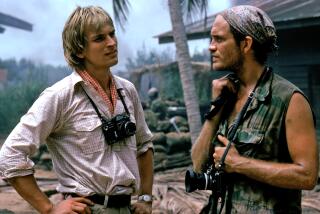Review: Awakening to the joy of ‘Oliver Sacks: His Own Life,’ a documentary for odd ducks
When a neurologist develops a second career as a bestselling author due to his talent for turning case studies into what he called “neurological novels,” it’s a wonderful twist to discover that the most fascinating life of all was his own. “Oliver Sacks: His Own Life,” Ric Burns’ majestic documentary, covers all eight decades of the unconventional physician’s life but is rooted in the final months before his death of cancer in 2015 at the age of 82.
Gathered in his New York home with friends and close colleagues just weeks after receiving his terminal diagnosis, Sacks regales us in his deep, British-accented voice about the ups and downs of his existence. He sounds like the happiest, most content man on the face of the Earth. It’s a marvel how he got to that point.
Partner Bill Hayes, longtime editor Kate Edgar, biographer Lawrence Weschler and others provide context and fill in the gaps. Much as Sacks chronicled the lives of his patients with tape recorders, cameras and Super-8, his own life was visually well-documented, and the film benefits.
In his memoirs, “Uncle Tungsten: Memories of a Chemical Boyhood” and “On the Move: A Life,” Sachs was as inquisitive about his own brain as he was the world, and that detail plays out here. Though covering much of the same ground as the books, there is an alchemy at work in the documentary that delivers an added dimension.
His life had a most unusual shape. It went from bad to worse and then better to best. During World War II, young Sacks and his brother Michael were sent to boarding school, where they were bullied and beaten. Michael was later diagnosed as schizophrenic, which affected Oliver deeply.
Coming of age as a gay Jewish man in 1950s Britain was near impossible, and Oliver made his way to San Francisco (though not before his mother called him “an abomination” for his yet to be acted upon sexuality). He had begun weightlifting, hoping physical strength would translate into a less timid persona — it didn’t work, he admits.
In California, he led a dual life as Dr. Oliver by day and Wolf (his middle name), a burly leather-clad biker, by night. He was abusing amphetamines by this point and had his heart broken by a Navy man in Venice. Swearing off relationships but not the drugs, Sacks landed in New York City in 1965.
Getting nowhere in his career and realizing his self-destructive behavior was killing him, he began seeing a psychiatrist, Dr. Leonard Shengold, who would treat him for the next 50 years. Sachs also began working directly with patients after striking out at research, and it changed his life.
It was a deep curiosity about human behavior and a desire to understand that led him to study afflictions such as autism, Tourette’s and encephalitis lethargica — the disease depicted in the book and movie “Awakenings” (which starred Robin Williams as a character loosely based on Sacks). Although he initially struggled with his writing, Sacks’ ability to translate his medical observations into literature allowed him to thrive. Many essays and bestselling books, including “The Man Who Mistook His Wife for a Hat,” followed.
In facing his demons, Sacks approached it as he did everything else, analytically, with great determination and empathy. He maintained his quirks and enthusiasms — a fascination with the periodic table, animals and nature, classical music, marathon swimming — while embracing an openness to new places and experiences, including finally finding love in his mid-70s with writer and photographer Hayes, after 35 years of celibacy.
“Oliver Sacks: His Own Life” is a moving portrait of a man taking deep stock of his life with great satisfaction and verve. It is, as Weschler says in the film, “a master class in how to die.” Sacks was an odd duck with a beautiful affinity for other odd ducks, and as an odd duck, I admire that.
‘Oliver Sacks: His Own Life’
Not rated
Running time: 1 hour, 54 minutes
Playing: Available Sept. 25, via Kino Marquee and Laemmle virtual cinema
More to Read
Only good movies
Get the Indie Focus newsletter, Mark Olsen's weekly guide to the world of cinema.
You may occasionally receive promotional content from the Los Angeles Times.











